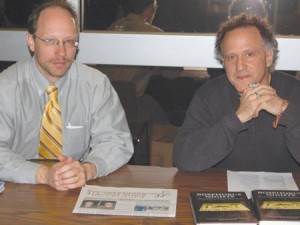Armen Melidonian
Staff Writer

Photo: Erica Magarian
Dr. James Russell, Mashtots Professor of Armenian Studies at Harvard University, spoke on “Misak Medzarents: Songs of Freedom, Defiance, and Joy” on Wednesday, March 16th, as part of the Armenian Studies Program Spring Lecture Series.
Much of the Western Armenian poet Medzarents’ work is a reflection of his life experience. Medzarents was born in 1886, in the Pengian village of Kharpert, in the Ottoman Empire. The discussions of village life in his poetry, “has very deep and historical roots,” noted Dr. Russell. Pengian was notable for resisting invasion, and Armenians who didn’t want to submit to the invaders would often seek refuge there.
Another reflection of Medzarents’ life in his work comes from an injury he received enroute to visiting a friend in June of 1901. The son of a Turkish butcher stabbed Medzarents in the back with a knife. Although Medzarents wasn’t killed, he suffered much pain, which can be seen in the poem “Wounds to the Body and Wounds to the Heart.” Dr. Russell stated that although Medzarents did not die from the wound, due to his suffering, “…he was murdered.” In his presentation Dr. Russell recited the poem “Sparks” in Armenian, while also distributing handouts of his English translations and analytical notes. In “Sparks,” each stanza expresses the intoxication, beauty, and marvel of an ecstasy using different senses.
The first stanza uses the sense of sound, the second uses visual imagery, the third stanza uses the sense of smell, and the fourth stanza combines the different senses. The poem is about immortality and makes reference to the story of the pagan Armenian god Vahakn, as recorded by the classical historian Movses Khorenatsi. It is, as Russell describes, “the assembly of all the weaponry” of Armenian poetry over the years.
Dr. Russell read “The Song of Life” in Armenian and noted that its phonetic structure repeats the sound “rev,” such as in “arev,” the Armenian word for sun. “The Dream of the Silk Worm” uses imagery familiar to Pengian, where silk was produced. These poems reflect about Medzarents’ upbringing. “Would, Would That I Were,” an excerpt from the poetry cycle “Ellayi, Ellayi,” is influenced by Edgar Allen Poe’s “The Bells,” expressing sound through repetition in the structure of each stanza.
Dr. Russell has been translating Armenian poetry for many years and pointed out that in translating the poems one develops a “pulse” and that the subconscious then catches up, developing a sense for the embedded style and rhetoric of the original Armenian text. He explains that as he translates the poetry, he reflects from two perspectives. One, as an Armenologist, considering what historical and cultural references the poet is making in the works, and second he is using his insight on poetry in the English language and considering comparisons to works of authors like Blake and Poe.
 Hye Sharzhoom Armenian Action
Hye Sharzhoom Armenian Action